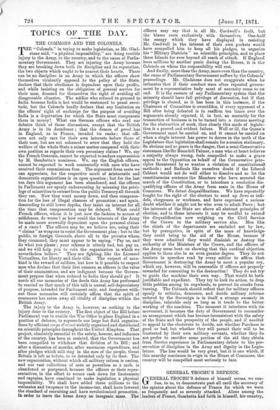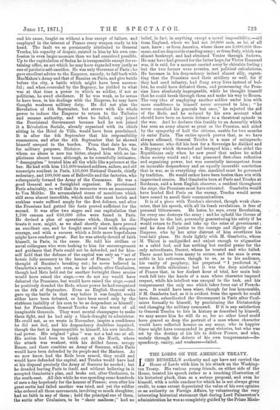GENERAL TROCHITS DEFENCE. G ENERAL TROCHIT'S defence of himself seems, we
con- fess, to us, to demonstrate past all cavil the accuracy of the opinion about the defence of France for which we were so frequently and so severely attacked. Alone among the leaders of France, Gambetta had faith in himself, his country, and his cause, fought on without a fear except of failure, and employed in the interest of France every weapon ready to his hand. The fault we so persistently attributed to General Trochu, his capacity of despair, existed in him by his own con- fession in even larger measure than we had conceived possible. *Up to the capitulation of Sedan he is irresponsible except for re- taining office, an act which he may have regarded very justly as one of patriotic self-sacrifice. He was only Governor of Paris ; he gave excellent advice to the Emperor, namely, to fall back with MacMahon's Army and that of Bazaine on Paris, and give battle before the city, a battle which might have been success- ful; and when overruled by the Regency, he yielded to what was at that time a power to which as soldier, if not as politician, he owed obedience. If he was weak, as he seems to have been, in his dealings with the Empress, he may have thought weakness military duty. He did not plan the Revolution of 4th September, but strove with his whole power to induce the Emperor to return to the Tuileries and resume authority, and when he failed, only joined the Provisional Government because had he not joined it a Revolution Sociale, already organized with its chiefs sitting in the Hotel de Ville, would have been proclaimed. It is after the 4th September that his responsibility commences, and after the 4th September that he showed himself unequal to the burden. From that date he was, for military purposes, Dictator. Paris, lawless Pads, for whom no abuse is now too bitter, obeyed him with an im- plicitness almost tame, although, as he resentfully intimates, " demagogism " treated him all the while like a prisoner at the bar. He had with him 115,000 trained soldiers, sailors, and old conscripts resident in Paris, 150,000 National Guards, chiefly sedentary, and 100,000 men of Belleville and the factories, who subsequently formed the Army of the Commune. He was a good General and a farsighted organizer. He provisioned Paris admirably, so well that its resources were an amazement to Von Moltke. He accumulated stores of munitions which still seem almost incredible, which amid the most lavish and reckless waste sufficed amply for the first defence, and after the Prussians had gutted the forts proved sufficient for the second. It was after two sieges and one capitulation that 1,700 cannon and 650,000 rifles were found in Paris. He devised a plan of operations which, though he dis- trusts it now, might, as we shall shortly show, have proved an excellent one, and he fought once at least with adequate courage, and with a success which a little more hopefulness might have rendered great. But he was utterly devoid of faith himself, in Paris, in the cause. He told his civilian or naval colleagues who were looking to him for encouragement and guidance that Paris could not be defended, and for him- self held that the defence of the capital was only an "act of heroic folly necessary to the honour of France." He never thought of Bazaine's breaking out ; he never believed in Gambetta's armies, not even, as he admits, after Coulmiers, though had Metz held out for another fortnight those armies would have raised the siege,—we do not say would have defeated the Prussians, but would have raised the siege,—and he positively dreaded the Reds, whose power he had recognized on the 4th of September. Even an English General who gave up the battle in that way before it was fought, would either have been defeated, or have been saved only by the stubborn inability of his men to be as despondent as himself ; but for Frenchmen General Trochu was the worst of all imaginable Generals. They want mental champagne to make them fight, and he had only a black-draught to administer. He could not, as we wrote in November, inspire a confidence he did not feel, and his despondency doubtless impaired, though the fact is imperceptible to himself, his own intellec- tual power. His original " plan " was not a bad one at all. His notion had been to break out at the North, where the attack was weakest, with his drilled forces, occupy Rouen, and there combine an Army of Succour, while Paris would have been defended by its people and the Marines. As we now know, had the Reds been armed, they could and would have defended the capital, and Trochu would have had at his disposal precisely the Army of Succour he needed ; but he dreaded leaving Paris to itself, and without believing in it accepted Gambetta's plan, and broke out, after Coulmiers, to the south-east. All this while he was spending some hundreds of men a day hopelessly for the honour of France; even after his great sortie had failed another was tried, and yet the soldier who ordered all those movements, involving so much slaughter, had no faith in any of them ; held the principal one of them, the sortie after Coulmiers, to be "sheer madness ;" had no belief, in fact., in anything except a moral impossibility,—aid from England, where we had not 50,000 men, as he, of all men, knew ; or from America, where there are 3,000,000 Ger- mans, and no disposable standing army; or from Italy, which was almost bankrupt, and had obtained Venice through Sadowa. He may have had ground for the latter hope, for Victor Emanuel was, it is said, for a moment carried away by chivalric feeling ; but the two former were reveries, not political calculations. He becomes in his despondency indeed almost silly, regret- ting that the Prussians used their artillery so well, for if they had used infantry, had flung away lives instead of bul- lets, he could have defeated them, and pronouncing the Prus- sian lines absolutely impregnable, while he thought himself that he could break through them and make his way to Rouen. The very idea of employing another soldier under him with more confidence in himself never occurred to him ; "he never consulted his generals but once," he rejected the aid of the Reds, and he reduced by his own account what should have been an heroic defence to a theatrical episode in the war. And he declares this frankly to an Assembly which has seen an army almost as great as the Prussian, and aided by the sympathy of half the citizens, unable for two menthe to enter Paris. The entire speech proves that, as we have always affirmed, General Trochu is a man of unimpeach- able honour, who did his best for a Sovereign he disliked and a Regency which thwarted and betrayed him ; who aided the Republicans only when he saw proof that unless he aided them society would end ; who possessed first-class reflective and organizing power, but was essentially incompetent from an incurable despondency and an equally incurable conviction. that in war, as in everything else, mankind must be governed by tradition. He would rather have been beaten than win with improvised armies. Had Gambetta been at Paris and Trochu at Bordeaux, said a keen English observer, a resident throughout the siege, the Prussians must have retreated. Gambetta would' have hurled Red Paris on the enemy, Trochu would never have ceased to assail their communications.
It is of a piece with Trochu's elevated, though weak char- acter, that his speech, with all its frank revelations, is free of personal bitternesses. He hates, he says, every Revolution, for every one destroys the army ; and he upheld the throne of Napoleon to the last, personally guaranteeing his safety if he would return to Paris and take up the reins of government ; and he does full justice to the courage and dignity of the Empress, who by her utter distrust of him overthrew his best-laid plans. He deals lightly with M. Gambetta, whom M. There is undignified and unjust enough to stigmatize as a rabid fool, and has nothing but cordial praise for the only subordinate, Ducrot, whom he trusted and who failed. There must have been many to accuse, and the man is even noble in his reticences, though to us, as to his audience, his vanity of prophecy, his perpetual "I predicted it," seems a little ridiculous • but it was the deep misfortune of France that, in her darkest hour of trial, her main bul- wark fell into the hands of a man whose character imposed respect, while his intellect was unequal to the task, and his temperament the only one which takes force out of French- men. It would have been wiser, though far less honourable, if M. Gambetta had, as it is evident from the speech he could have done, subordinated the Government in Paris after Coul- miers formally to himself, by proclaiming the Dictatorship and changing the military command. If it is any satisfaction to General Trochu to live in history as described by himself, we may assure him he will do so, for no other hand could have graved so deep the portrait of a man whose character would have reflected honour on any army, who in happier times might have commanded in great victories, but who was set by the destiny of his life to deliver France, and who, mainly through the defects of his own temperament—de- spondency, vanity, and weakness—failed.



































 Previous page
Previous page